新概念英语第一册第73课学习资料
新概念第一册Lesson-73-74完整版

2021/5/3
新概念第一册Lesson-73-74完整版
9.can 能够 • 结构: • 情态动词+动词原形
变疑问句时情态动词 提前
eg:I can sing. → Can you
sing? He can swim.
→ Can he swim?
2021/5/3
新概念第一册Lesson-73-74完整版
phrasebook?
新概念第一册Lesson-73-74完整版
Last week Mrs. Mills went to London. She does not know London very well,
and she lost her way.
新概念第一册Lesson-73-74完整版
Suddenly, she saw a man near a bus stop. 'I can ask him the way.' she said to herself.
this week, last week, (前面不能加介词) the week before last 上上周 the week after next 下下周
新概念第一册Lesson-73-74完整版
★ London /'lʌndən/ n. 伦敦 英国的首都
2021/5/3
新概念第一册Lesson-73-74完整版
(3)speaking Frankly speaking 坦率地说 generally speaking 一般地说 strictly speaking 严格地说 eaxactly speaking 确切地说
新概念第一册Lesson-73-74完整版
★ hand /hæ nd/ give sb a hand
新概念英语73课讲义

Lesson 73 the way to King Street一、单词与短语week: n. 周;weekend:周末;London: n.伦敦;in London:在伦敦;Suddenly:adv.突然地;补充:all of a sudden=suddenly:突然地;bus stop:公共汽车站;补充:railway station:火车站;airport:飞机场;smile: v.微笑;wear smile:面带微笑;pleasantly:adv.愉快地;补充:have a pleasant time:玩得高兴;understand:v.懂,明白;补充:make oneself understood: 让别人了解自己;Speak:v.讲,说;speak后边常跟具体的语言,如说汉语:speak Chinese;说英语:speak English;hand: n.手;补充:raise your hand:举手;wave your hand:挥手;pocket:n.衣袋;phrase:n.短语;slowly: adv.缓慢地;二、短语、句型及语法1、She does not know London very well, and she lost her way.他对伦敦不很熟悉,因此迷了路;在本句中有两个知识点需要引起注意:①know、、、well:对、、、了解,例:I know him very well.我非常了解他;I do not know the book very well.我对这本书不是很了解。
②关于与way相关的几个重要短语:lose one′s way: 迷路;I lost my way yesterday:昨天我迷路了;on the way to、、、在去、、、的路上;例:Tom is on the way to school now.汤姆现在正在去学校的路上。
by the way:顺便提一下,顺便问一下,例:By the way, I have something to tell you.我顺便有些事情想告诉你。
新概念英语第一册第73课
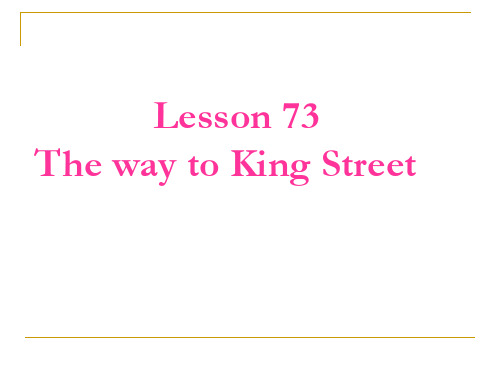
homework
1.听录音并跟读, 2.每个单词5遍,包括不规则动词
课文准备默写 3. 课课练
动词的过去式总结
一般来说,规则动词 v+ ed played, watched 等 以e结尾的动词, 直接+d telephoned, smiled, arrived 等 不规则动词 find-found, see-saw, speak-spoke, put-put
等 需要记忆
phrasebook /freɪz/ 短语手册
pocketˈ /pɒkɪt/ 口袋
speak /spiːk/ 说
watch the video and answer these questions.
Where did Mrs. Mill go last week? Why did the man need a phrasebook? What’s the man’s job(工作)? role playing
listen to the tape again
Last week Mrs. Mills went to London. She does not know London very well, and she lost her way.
Suddenly, she saw a man near a bus stop. 'I can ask him the way.' she sai way to King Street
Do you know the way to King Street?
Last week, Mrs. Mills wanted to go to King street, she didn’t know the way, either. Let’s see what happened?
新概念第一册73课
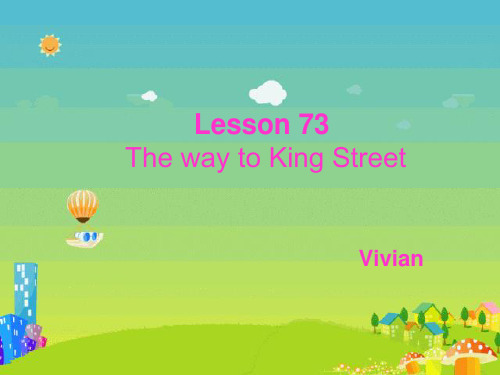
特殊疑问 句及其回 答 What do you like? I like milk.
Thank you Goodbye
Where did she see a man?
She saw a man near a bus stop.
What did she say to him?
She said, ’Excuse me .Can you tell me the way to King Street ,please?’
Lesson 73 The way to King Street
Vivian
• `
and
• Listen to the tape then answer this question. Why did the man need a phrasebook?
• 听录音,然后回答问题。为什么这 位男士需要一本常用语手册?
I don’t do… He doesn’t do … I did… I didn’t Did you What did do… drink milk? you He did… He Yes, I did. drink? didn’t I drank do… milk.
一般疑问 句及其回 答 Do you like milk? Yes, I do.
Did he speak English?
No, he didn’t.
Was he a tourist?
Yes ,he was.
用法
时态
动词 形式
肯定句 否定句
一般现一般、 原形/ I do… 在时 经常、 三单 He 习惯、 do/do does… 真理 es
一般过 过去 去时 某一 时 间做 了某 事 过去 式 did
新概念第一册73课
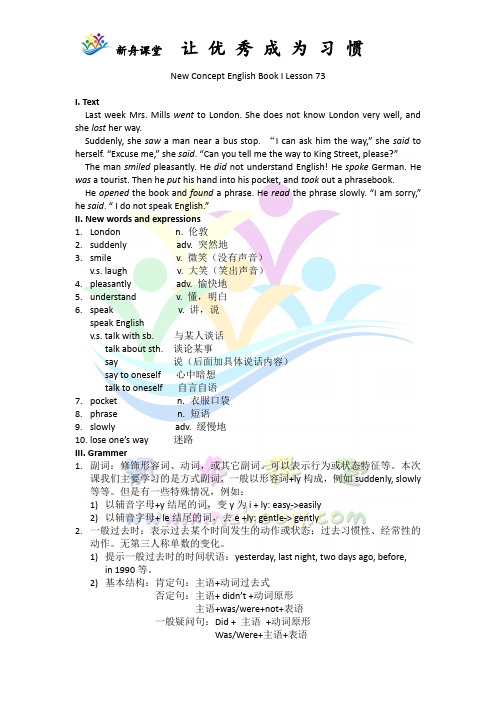
New Concept English Book I Lesson 73I. TextLast week Mrs. Mills went to London. She does not know London very well, and she lost her way.Suddenly, she saw a man near a bus stop. “I can ask him the way,” she said to herself. “Excuse me,” she said. “Can you tell me the way to King Street, please?”The man smiled pleasantly. He did not understand English! He spoke German. He was a tourist. Then he put his hand into his pocket, and took out a phrasebook.He opened the book and found a phrase. He read the phrase slowly. “I am sorry,”he said. “ I do not speak English.”II. New words and expressions1.London n. 伦敦2.suddenly adv. 突然地3.smile v. 微笑(没有声音)v.s. laugh v. 大笑(笑出声音)4.pleasantly adv. 愉快地5.understand v. 懂,明白6.speak v. 讲,说speak Englishv.s. talk with sb. 与某人谈话talk about sth. 谈论某事say 说(后面加具体说话内容)say to oneself 心中暗想talk to oneself 自言自语7.pocket n. 衣服口袋8.phrase n. 短语9.slowly adv. 缓慢地10.lose one’s way 迷路III. Grammer1.副词:修饰形容词、动词,或其它副词。
新概念英语第一册73课lesson73thewaytoking

The composition of coordinate sentences
Each clause in a coordinate sentence has its own subject and verb, and the clauses are of equal grammatical importance.
The subject of a simple sentence can be a noun or pronoun, and the predicate includes the verb and any complements or
adjuncts.
Simple sentences can be declarative, interrogative, or imperative in form.
Sentence Analysis
• "We set off on our hike with high spirits, excited about the adventure ahead." - This sentence sets the scene for the story and introduces the main characters - a group of friends excited about their upcoming adventure. It also suggests that they are in a positive mood and ready to face any challenges that may come their way.
新概念第一册73课课文
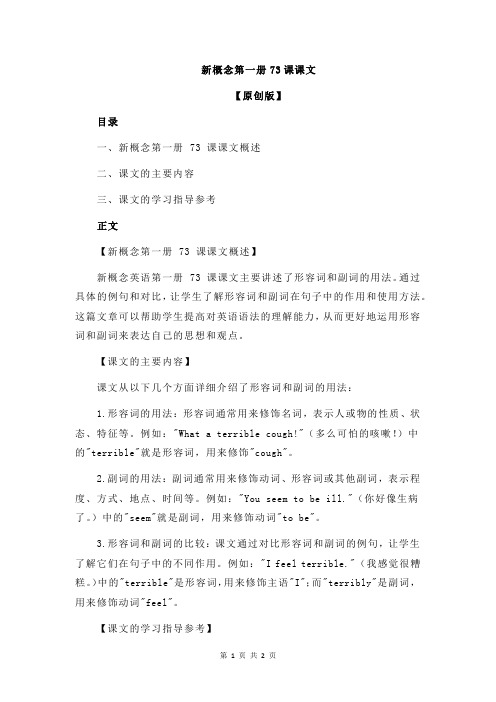
新概念第一册73课课文【原创版】目录一、新概念第一册 73 课课文概述二、课文的主要内容三、课文的学习指导参考正文【新概念第一册 73 课课文概述】新概念英语第一册 73 课课文主要讲述了形容词和副词的用法。
通过具体的例句和对比,让学生了解形容词和副词在句子中的作用和使用方法。
这篇文章可以帮助学生提高对英语语法的理解能力,从而更好地运用形容词和副词来表达自己的思想和观点。
【课文的主要内容】课文从以下几个方面详细介绍了形容词和副词的用法:1.形容词的用法:形容词通常用来修饰名词,表示人或物的性质、状态、特征等。
例如:"What a terrible cough!"(多么可怕的咳嗽!)中的"terrible"就是形容词,用来修饰"cough"。
2.副词的用法:副词通常用来修饰动词、形容词或其他副词,表示程度、方式、地点、时间等。
例如:"You seem to be ill."(你好像生病了。
)中的"seem"就是副词,用来修饰动词"to be"。
3.形容词和副词的比较:课文通过对比形容词和副词的例句,让学生了解它们在句子中的不同作用。
例如:"I feel terrible."(我感觉很糟糕。
)中的"terrible"是形容词,用来修饰主语"I";而"terribly"是副词,用来修饰动词"feel"。
【课文的学习指导参考】为了更好地学习这篇课文,学生可以参考以下学习指导:1.熟读课文,理解形容词和副词的定义和用法。
2.通过例句加强对形容词和副词的理解,注意它们在句子中的位置和作用。
3.练习使用形容词和副词,提高自己的表达能力。
4.与同学或老师交流,分享自己对形容词和副词的理解和运用心得。
新概念第一册73课
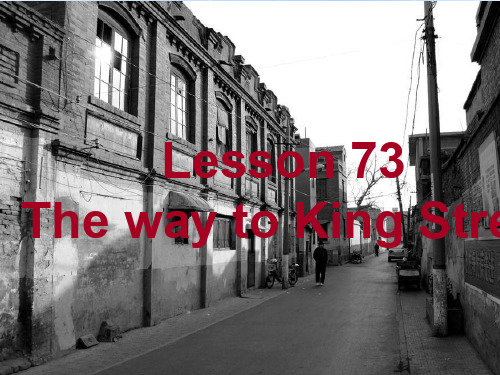
★ smile warm smile on her face.
look, she is smiling at me
★smile at sb.对着某人微笑
• Listen to the tape, then answer this question.
• Why did the man need a phrasebook?
课文讲解
• 1. Last week上周,这个短语奠定了本课是 过去时的基础。 这周 this week,下周 next week
front door.
• ls _w_a_s_(is) in London last week.
• 6.She _w__e_n_t _(go) to Paris last year .
• 7.The mand_r_a_n_k_(drink) their tea very
quickly.
• give sb. a hand 帮助某人 • on the one hand 一方面 • on the other hand 另一方面 • hand in hand 手拉手 • hand in 上交,交付 • hand over to移交给
★lose v. (lost—lost) v.使)迷路迷;(失
Lesson 73 The way to King Stre
规则:将下列给出的单词字母进行重新组合, 得出另外一些单词,看谁说得多!
woman answer father honest
• week
n. 周
• London
n. 伦敦
• suddenly
新概念英语第一册课文翻译及学习笔记Lesson73
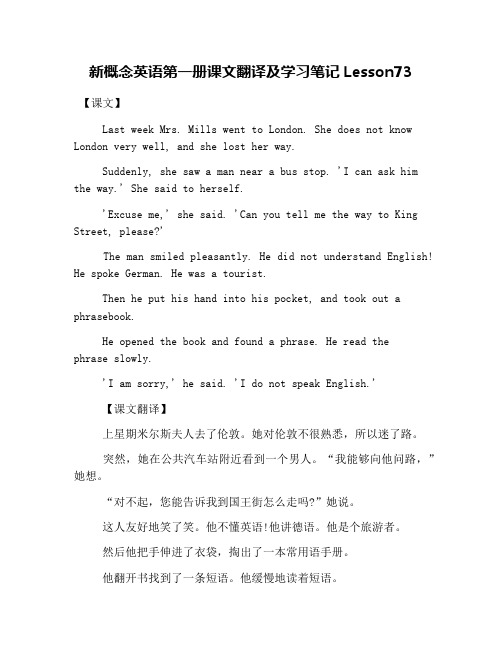
新概念英语第一册课文翻译及学习笔记Lesson73【课文】Last week Mrs. Mills went to London. She does not know London very well, and she lost her way.Suddenly, she saw a man near a bus stop. 'I can ask him the way.' She said to herself.'Excuse me,' she said. 'Can you tell me the way to King Street, please?'The man smiled pleasantly. He did not understand English! He spoke German. He was a tourist.Then he put his hand into his pocket, and took out a phrasebook.He opened the book and found a phrase. He read thephrase slowly.'I am sorry,' he said. 'I do not speak English.'【课文翻译】上星期米尔斯夫人去了伦敦。
她对伦敦不很熟悉,所以迷了路。
突然,她在公共汽车站附近看到一个男人。
“我能够向他问路,”她想。
“对不起,您能告诉我到国王街怎么走吗?”她说。
这人友好地笑了笑。
他不懂英语!他讲德语。
他是个旅游者。
然后他把手伸进了衣袋,掏出了一本常用语手册。
他翻开书找到了一条短语。
他缓慢地读着短语。
“很抱歉,” 他说,“我不会讲英语。
”【生词】week n. 周London n. 伦敦suddenly adv. 突然地bus stop 公共汽车站smile v. 微笑pleasantly adv. 愉快地understand (understood ) v. 懂,明白speak (spoke ) v. 讲,说hand n. 手pocket n. 衣袋phrasebook n. 短语手册,常用语手册phrase n. 短语slowly adv. 缓慢地【知识点讲解】在新概念一的课本里,73课前面有一个小测试,有书的同学能够自己做一下检验一下学到现在的水平。
新概念英语第一册 lesson73

Lesson 73 – 74Ⅰ. VOCABULARY1.lose v.(1)迷失;(使)迷路:She did not know London very well, and she lost her way. 她对伦敦不很熟悉,因此迷了路。
It's very easy to lose your way in a strange city. 在一个陌生的城市里,你很容易迷路。
(2)失去;丧失:He lost his sight in a car accident. 他在一起汽车交通事故中失明了。
She has just lost her job because of carelessness. 她刚刚因疏忽大意而丢了工作。
(3)遗失;丢失:I can't enter my house because I've lost my key on my way home.我进不了自己的房子,因为在回家的路上我把钥匙丢了。
We lost her in the crowd. 我们在人群中找不见她了。
2.understand v.(1)理解;懂:He doesn't understand English and you can try French. 他不懂英语,你可以试试法语。
I don't understand what you mean. 我不明白你的意思。
(2)明了;了解;得知:How the machine works is still not fully understood. 这台机器到底是如何运转的仍未被完全弄清楚。
Ⅱ. GRAMMAR:1.副词副词(adverb)这个词的本意是补充动词的意义。
这就是许多副词的作用。
它们可以通过修饰动词告诉我们有关句中某个动作的情况,也就是告诉我们某事是如何、何时、何地等发生或进行的。
副词可以是单个的词(如slowly)或词组(如very well)。
新概念英语第一册第73课精编版
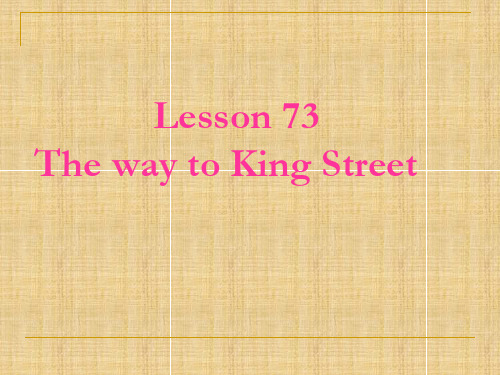
well.
lose one’s way 迷路(丢失了某人的路)。 lose my way, lose our way lose-lost. 这里的and相当于so。不翻成和
动词的过去式总结
一般来说,规则动词 v+ ed played, watched 等 以e结尾的动词, 直接+d telephoned, smiled, arrived 等 不规则动词 find-found, see-saw, speak-spoke, put-put
等 需要记忆
suddenly 既可以放在句首,也可以放在句中或 句末。 see-saw see看见,near 在附近。 near our school
ask sb. sth. 问某人某事。ask-asked 例句:He asked the teacher a question. say-said say to oneself 心中暗想myself,
Where is ......? the way to… 去...的路 这里的pleasantly是个副词(adv),修饰动作
smile。smile-smiled
He did not understand English. 改成肯定句
He understood English. did 是助动词 do/does 的过去式。 He spoke German. 改成 否定句,一般疑问
yourself, himself, herself, itself, ourselves, yourselves, themselves
新概念英语第一册第73课Lesson73课文单词知识点

【知识点讲解】1. 今天还是继续熟悉一般过去式。
我们看到在课文一开始就用Last week 来点明事件发生的时间,把整个语境都摆到了过去的状态里。
有同学可能会问:那第二句也用到 She does not know London very well... 这里也是一般现在时态啊!我们要注意的是,这里说“米尔斯夫人不熟悉伦敦”是一个持续的状态,不是说米尔斯夫人在上周才不熟悉伦敦,而是她一直以来都不熟悉,所以这里前半句用的是一般现在时态,紧跟着的一句“she lost her way ” 又回到一般过去式了。
,2. 还是第二句中“...and she lost her way.” 这里我们看到中文的翻译是“所以她迷路了”。
这并不是说and 的意思可以是“所以”,and 还是“以及、和”的意思,这里只是用中文惯式的连词“所以”来翻译了这个意思而已。
3. 今天又学到了两个不规则的动词过去变化,大家要特别记忆一下:speak -Lesson73Last week Mrs. Mills went to London. She does not know London very well, and she lost her way.Suddenly, she saw a man near a bus stop. 'I can ask him the way.' She said to herself.'Excuse me,' she said. 'Can you tell me the way to King Street, please'The man smiled pleasantly. He did not understand English! He spoke German. He was a tourist.Then he put his hand into his pocket, and took out a phrasebook.He opened the book and found a phrase. He read the phrase slowly.'I am sorry,' he said. 'I do not speak English.' 上星期米尔斯夫人去了伦敦。
新概念第一册73课
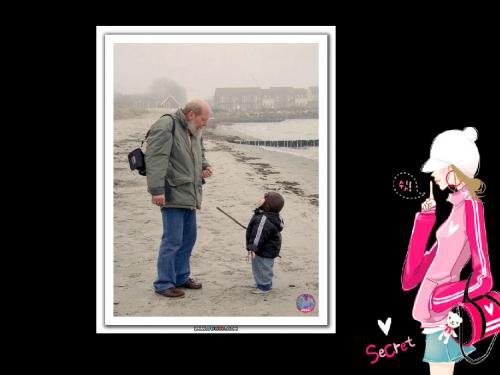
Lesson 73 The way to King Street. Lesson 74 What did they do?
Because he didn’t understand English.
Unit 37
( 7 )understand ( 8 )speak ( 11)phrasebook ( 12)phrase ( 13)slowly ( 9 )hand( 1 )week ( 2 )London( 5 )smiled ( 6 )pleasantly ( 10)pocket ( 3 )suddenly ( 4 )bus stop
suddenly adv.突然地
sudden adj. 突然的,意外的 all of a sudden 突然,冷不防
Suddenly, she saw a man near a bus stop. 突然,她在公共汽车站附近看到一个男人。
smile [smail]微笑
laugh
laugh at
• 形容词来修饰名词
• • • •
I work hard. You sing well. Jane drives carefully. Kevin runs fast.
• 副词来修饰动词
He read the phrase slowly.
He cut himself badly.
Listen and speak English !
找找文中出现的副词,你认识吗?
• • • • well suddenly pleasantly slowly
形容词与副词的变化方式包括以下三类: 形容词词尾加ly 成为副词 1.quiet--- quietly slow--- slowly beautiful---beautifully 2. 形容词与副词同形 例如:fast--- fast hard--- hard 3. 形容词与副词完全不同 例如:good--- well
新概念英语单词第一册第73课到国王街的走法

1 / 4新概念英语单词第一册第73课:到国王街的走法【单词例句】A:How long will the meeting last? A:这次的会议要持续多长时间?B:It will last for about one week. B:大约要持续一周时间。
London ['lndn]伦敦suddenly ['sd()nl] adv.突然地【单词例句】A:I feel quite embarrassed for suddenly having to makethis kind of request. A:突然不得不提出这样的请求,实在不好意思。
B:It doesn't matter. Go ahead, please. B:没关系,请说吧。
bus [bs] stop [stp]公共汽车站smile [smal]微笑【单词例句】A:To go to the English Comer is to give you a goodchance to open your mouth to speak.A:去英语角就是给你一个开口说英语的好机会。
B:MaybeI can go thereto have a try. B:也许我能够去那儿试一试。
2 / 4hand [hnd]手【派生词】handkerchief手帕【单词扩充】arm手臂【单词搭配】hand in hand手牵于hands up举手give a hand协助【单词例句】A:Hold the steering wheel with your hands at teno'clock and two o'clock. A.把手握在方向盘的10点及2点钟方向。
B:And what shallI do then? B:我接着该这么做?pleasantly ['plezntli]adv愉快地understand ['plezntli]懂,明白【派生词】understanding理解nusunderstand误解【单词搭配】understand each other互相了解【单词例句】A:We have to be fair about these things A:对这种事情,我们一视同仁。
新概念英语第一册第73-74课资料
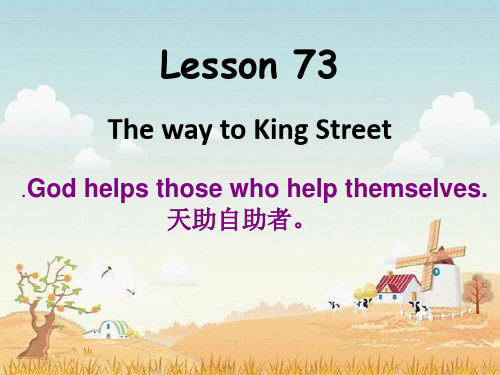
但是way后面不是完整的句子,只能用 that或which引导定语从句
The way that/which I used is wrong
诋毁/说…坏话/说…好话/赞扬
课文讲解
• 1.She does not know London very well, and she lost her way.
• know …well 对……了解 我对他不是很了解。
I don’t know him very well. • and 此处指的是“因此,所以”
★ lose v.
• (1)迷失;(使)迷路: • She did not know London very well, and she lost her way. • 她对伦敦不很熟悉,因此迷了路。 • Its very easy to lose your way in a strange city. • 在一个陌生的城市里,你很容易迷路。 • (2)失去;丧失: • He lost his sight in a car accident. • 他在一起汽车交通事故中失明了。 • She has just lost her job because of carelessness. • 她刚刚因疏忽大意而丢了工作。
形容词、副词
• 形容词是什么?副词又是什么?我们用一个句子来说明。 She is a good student, and she works hard. 本句中,good 就是形容词,而hard 则是副词
• 形容词用来修饰名词或代词, 表示人或事物的性质, 状态, 和特征。
新概念一册73课
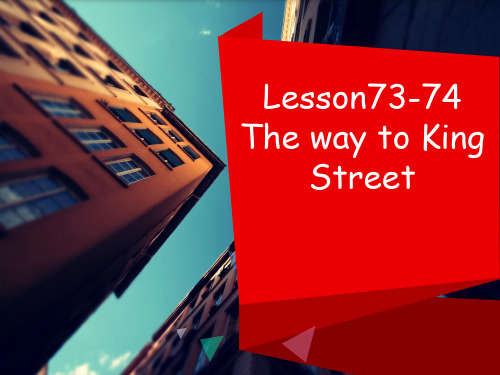
Words
11.slowly adv. 缓慢地
e.g. 闪电说话特别慢。 Flash speaks very slowly. 词转: slow 1)adj. 缓慢的 2)v. (使)减慢: slow down 慢下来 e.g. Slow down!I’m throwing up!
Words
12.hurriedly adv. 匆忙地 词转: 1)hurried adj. 匆忙的 2)hurry v.匆忙做某事 (-hurried) 匆匆忙忙 n.匆忙:in a hurry in no hurry 不慌不忙
ADD YOUR TITLE HERE
ADD YOUR TITLE HERE Add your text here and
write down your
personal idea add your text here and write
4.3
ADD YOUR TITLE HERE
3.5
2.5
- heavily 大量地 - quickly 迅速地 ADD - quietly 安静地 YOUR TITLE - differently 不同地 - gently 温柔地 - busily 忙碌地 - happily 幸福地 - terribly 非常糟糕地
2.用法:修饰v. /adj. heavily 1) It is raining ______ (heavy) outside. 外面雨下得很大。
S3. Suddenly, she saw a man near a bus stop. 4.near a bus stop 在公交车站附近 反义词:be far from…
S4. 'I can ask him the way.' she said to herself. 3.say to oneself 自言自语 e.g. Jack总是自言自语。 Jack often says to himself.
- 1、下载文档前请自行甄别文档内容的完整性,平台不提供额外的编辑、内容补充、找答案等附加服务。
- 2、"仅部分预览"的文档,不可在线预览部分如存在完整性等问题,可反馈申请退款(可完整预览的文档不适用该条件!)。
- 3、如文档侵犯您的权益,请联系客服反馈,我们会尽快为您处理(人工客服工作时间:9:00-18:30)。
week [wi:k]
n. 周
London ['lʌndən] n. 伦敦
suddenly [ˈsʌdənli] adv.突然地
bus stop 公共汽车站
smile [smaɪl] v.微笑
pleasantly ['plezntlɪ] adv.愉快地
understand [ˌʌndə'stæ nd] v.懂,明白
4. ask sb sth 向某人问某事
She said to herself. 她自言自语道. say to oneself 自言自语 反身代词: myself, ourselves, herself, himself,
itself, themselves, yourself, yourselves
15
5. 问路: ➢ Can you tell me the way to ……? ➢ How can I get to ……? ➢ Where is ……? ➢Is there a......near here? ➢Which is the way to ......?
16
5. 去……的路: ➢ the way to …… ➢ 去公交车站的路 ➢ the way to the bus stop
hurriedly adv.匆忙地 cut v. 切 thirstily adv.口渴地 go - went v. 走 greet v. 打招呼
5
形容词用来修饰名词或代词, 表示人或事物 的性质, 状态,和特征。
副词是一种用来修饰动词,形容词,副词或 句子,说明时间,地点,程his week 本周 ➢ last week 上周 ➢this week 在本周
➢在有this ,that的指示代词或last,next 修 饰的名词短语前不能加介词。
12
2. She does not know London very well, and she lost her way.
18
7. hand n. 手 v 交出; 传递 ➢ give sb. a hand ➢ 帮助某人 ➢ hand in hand ➢ 手拉手
19
他匆忙地刮脸,然后 伤到了他自己。
What did he do this morning? He shaved hurriedly and cut himself
8
3.某些以辅音字母加不发音的字母e结尾和以 -ue结尾的形容词要先去掉e,然后再加-y或ly。
terrible-terribly; true-truly; gentle-gently
9
4. 在英语中,有些词既可以作形容词,又可以 作副词,如early, much, fast, little, wide, loud等
6
1.一般情况下在形容词词尾直接加-ly。 real-really; careful-carefully; slow-slowly; quick-quickly;
7
2. 以辅音字母加y结尾的形容词要变y为i,然 后再加-ly。
busy-busily; angry-angrily; easy-easily ; happy---happily thirsty----thirstily
understood [ˌʌndə'stʊ:d]
speak [spi:k] v.讲,说 spoke [spəʊk]
hand [hæ nd] n.手
pocket ['pɒkɪt] n.衣袋
phrase [freɪz] n. 短语 phrasebook 短语手册
slowly [ˈsləʊli] adv.缓慢地
know …well
对……了解
我对他不是很了解。
I don’t know him very well.
13
3. lose v. (使)迷路,失去(lost—lost)
➢lose one’s way ➢迷路 形物代 ➢lose heart ➢ 失去信心,泄气 ➢lose weight ➢ 减肥
14
复习一般过去时
contents
副词的构成和用法
1
妈妈昨天早晨做什么了? What did mom do yesterday morning? 她昨天早晨整理床了. She made the bed yesterday morning.
2
他什么时候打的电话? When did he telephone? When did he call? 他昨天下午打的电话. He telephoned yesterday afternoon. He called yesterday afternoon.
badly.
20
我给他一杯牛奶. 他很渴地喝牛奶.
What did he do this morning? I gave him a glass of water and he drank
the milk thirstily.
21
我给他一块蛋糕, 他吃得很快.
What did he do yesterday afternoon? I gave him a piece of cake and he ate it
17
6. put-put-put,take-took-taken 把…放进去 put… into… 把…取出 take out… 他把书放进了书包。 He put the books into his schoolbag. 他拿出了一串钥匙。 He took out a set of keys.
10
模仿例句完成以下句子。 1. He read the phrase __s_lo_wl_y _ . (slow) 2. He worked __l_az_ily__ . (lazy) 3. He cut himself __b_a_dl_y _ . (bad) 4. He worked _c_a_re_fu_lly_ . (careful) 5. The door opened _s_u_dd_en_ly_ . (sudden)
